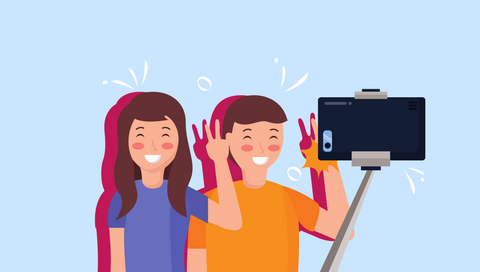With millennials commonly known as the ‘selfie generation’ more time is spent on screens than ever before. According to research, the average adult now spends 13 hours a day and 4,866 hours each year on screens - which is a lot of exposure to blue light.
From looking at our phones on the commute, working on a screen all day and watching TV to unwind in the evenings, it’s safe to say that most things involve a screen.
So, could all of that added time in front of blue light lead to premature ageing? Ocushield investigates.
Blue light and your skin
Research has shown high-energy visible light that is emitted from smartphones can possibly damage your skin. Why? High energy visible light is also known as the high-frequency light in the blue/violet spectrum, with wavelengths of 400 - 500 nm and has been found to penetrate deeper than UV rays, making it as harmful as UV light (if not worse).

We know that sun exposure can cause skin damage, but it’s also important to be aware of screen exposure - which emits the same blue light from inside (pass us the sun cream!). While the amount of blue light from screens is relatively lower compared to the ones we get from sun exposure, the concern over the long-term impact of screen exposure is getting higher. This is because we are much closer to screens and spend a lot more time directly in front of them than we do outside.

Blue light has been shown to induce oxidative stress in live skin, which contributes to skin ageing - similarly to UVA rays. However, blue light is able to penetrate deeper into the skin than UVA and UVB light and can reach all the way to the dermis, which is where collagen and elastin live. By reaching this area of the skin, blue light can contribute to developing wrinkles, enlarged pores, increasing pigmentation and darker circles. Premature ageing can also have two other factors; pollution & sun damage, however now it has been shown that HEV light is an additional factor to add to the lis
How to prevent premature ageing from blue light
So how can we reduce HEV damage?
According to some experts, if you're serious about preventing premature ageing, UVA and UVB protection is no longer enough. With the amount of time spent on digital screens, protection from blue light is essential.
While sun cream helps, this works to stop UV rays from damaging the skin, but as HEV light can penetrate the skin in other ways, sun screen is not enough. In order to maintain the skin’s health and prevent it from affects such as premature ageing, the skin must be shielded from HEV light. The melanin, which is a pigment found in our skin, which occurs naturally, is thought to be our first defence from harmful rays. However, the absorbance of HEV light from melanin is relatively low.
Of course, screen work is a major part of our daily lives, making it harder to just walk away from all the screens and of course, selfies! Using an antioxidant cream can also be helpful. Research has shown that smartphones may be as bad, if not worse than the sun for your skin, so remember to keep an open mind and consider protection while taking them selfies!
Luckily for you, we’ve developed the world’s only medically rated blue light filters that stop blue light at the source, so you can spend time on screens without having to worry about the damaging effects it has on your skin and wider health.
How we reviewed this article:
Ocushield has strict sourcing guidelines and relies on peer-reviewed studies, academic research institutions, and medical associations.
Our experts continually monitor the health and wellness space, and we update our articles when new information becomes available.
Written By
Dhruvin Patel | BSc Hons, MCOptom, Optometrist
Edited By
Omba Kumwenda
Medically Reviewed By
Asad Hamir | BSc Hons, Optometrist
Copy Edited By
Omba Kumwenda

Leave a comment